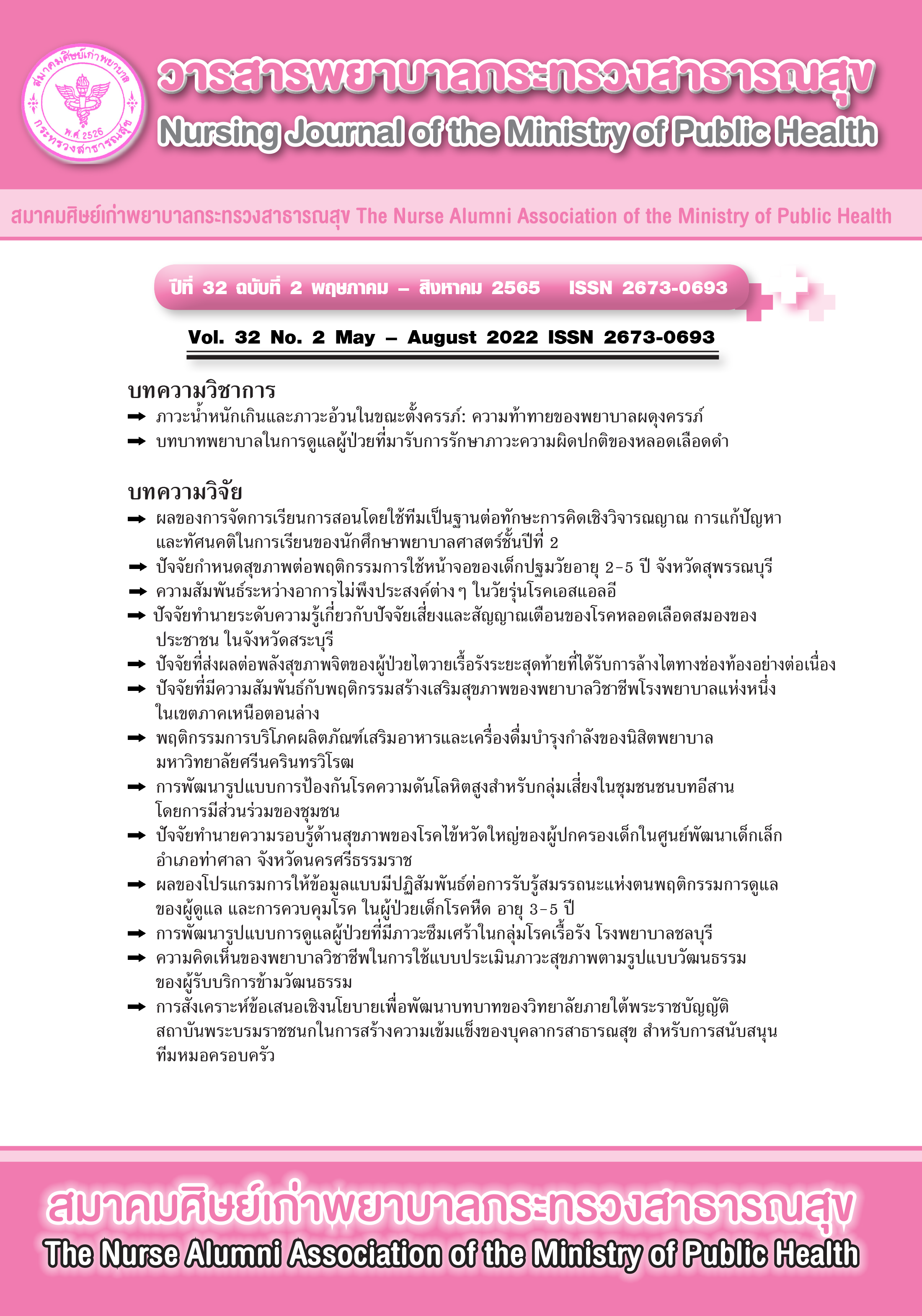The Behaviors of Consuming Dietary Supplementary Products and Energy Drinks among Nursing Students, Srinakharinwirot University
Main Article Content
Abstract
The aim of this study was to find out the consumption behaviors and factors correlated with consuming dietary supplements and energy drinks among nursing students of Srinakharinwirot University. The sample consisted of 196 nursing students (1-4 years). The statistics used to analyze the data were percentage, mean and standard deviation, and Spearman’s rank correlation coefficient. The main findings showed that 49.00% of the sample consumed dietary supplementary
products and 41.80% consumed energy drinks. The factors related to the consumption of dietary supplements were: Grade Point Average (GPA) and knowledge of quality and reliability of the product; the correlation coefficients (rs) were .15 and .33 (p=.03, .01), respectively, which means that the GPA and knowledge of quality and reliability of the product varies consumption level of dietary supplements. The factor related to the level of energy drink consumption was the distribution channel. The correlation coefficient (rs) was .16 (p=.02) which means that energy drink consumption level varies with distribution channel. The results of this study can be used as basic information for the design and development of programs to address consumption behavior problems of dietary supplements and energy drinks among nursing students, who are leaders in public health promotion. The emphasis should be on the importance of reducing energy drink consumption that impacts health.
Article Details

This work is licensed under a Creative Commons Attribution-NonCommercial-NoDerivatives 4.0 International License.
บทความและรายงานวิจัยในวารสารพยาบาลกระทรวงสาธารณสุข เป็นความคิดเห็นของ ผู้เขียน มิใช่ของคณะผู้จัดทำ และมิใช่ความรับผิดชอบของสมาคมศิษย์เก่าพยาบาลกระทรวงสาธารณสุข ซึ่งสามารถนำไปอ้างอิงได้
References
Prajukwong R, Sanchaisuriya P. Prevalence and factors related to dietary supplement consumption of personnel in Sakonnakhon Hospital. Journal of Sakon Nakhon Hospital 2013;16(2):60-8.(in Thai)
Jittasirinuwat P. The survey found 70% of Thai mistakenly believe that supplementation is necessary to eat regularly [internet]. 2020 [cited 21 February 2017]. Available from: https://www.hfocus.org/content/2017/02/13475.(in Thai)
Prachachatturakit A. Energy drink competition 3.6 billion [internet]. 2018 [cited: 1 August 2019]. Available from: http://www.prachachat.net/news_detail.php?newsid=1486359105.(in Thai)
Ponchai B. A study of attitude and dietary supplement product consumption behavior among nursing student in Nakhon Phanom University. FDA Journal 2016;Jan-April:51-7.(in Thai)
Promsavast T. Marketing mix factors affecting maintaining brain and memory supplements’ buying behavior of consumers in Bangkok [Master thesis]. Bangkok: Srinakharinwirotwirot University;2012.(in Thai)
Dejpraprsorn N. Factors affecting online purchase decisions for dietary supplements in Thailand [Master thesis]. Bangkok: Thammasat University;2015.(in Thai)
Yothongyod M. Sawadisan P. [Internet]. 2008 [cited 2020 August 15]. Available from: http://www.fsh.mi.th/km/wp-content/uploads/2014/04/resch.pdf
Kulkrachang K. and Lowwirakorn S. Health Promotion Beverage Consumption Behavior of Boromarajjonani College of Nursing Students, Nakhon Ratchasima. KKU Journal for Public Health Research (KKU-JPHR) 2013;6(1):11-21.(in Thai)
Sawaka J. Energy drink consumption among workers in Tonthong Sub-district, Mueang District, Lamphun Province. [Master thesis]. Chiang Mai: Chiang Mai University.2015.(in Thai)
Chotvijit Y. Marketing strategies for healthy whey protein drink in the central region of Thailand. Western University Research Journal of Humanities and Social Science 2016;2(1):11-21.(in Thai)

